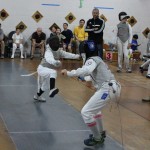
When I first started fencing at the Sacramento Fencing Club, there was a gangly fencer named James who always came in early, warmed up on his own and started doing footwork in front of the mirror. He would constantly check and correct his form while doing his footwork. After practice he’d spend additional time doing strength exercises and stretching. He did these things in addition to the two hour practices 4 days a week. This fencer, James Williams, went on to fence for Columbia University, and later helped the U.S. Men’s Saber Team earn Silver at the 2008 Olympic Games.
Once you’ve set your goals for what you want to achieve in your athletic career, the next step is to figure out how you plan to get there. If your plan is to become nationally or internationally ranked, or to become a varsity athlete in a university, you need to be prepared to go the extra mile. Because of the complex skill set and agility required of the sport, high level fencers often train 20 to 25 hours per week, sometimes more.
Their training includes group practices, private lessons, strength training, conditioning, and sports psychology. They do this amount of training because they understand that in order to be the best, just doing to bare minimum of what is required is not enough.
If you are a beginning fencer, this amount of practice can seem over-whelming. Well, that’s ok. You haven’t reached the point of 25 hour+ practice weeks (yet), but there are things you can do to help yourself get ahead even if you’re not ready to commit to training for the 2020 Olympic Games. First, you can begin by identifying your weaknesses. As a young fencer I was a terrible athlete; I hated running and doing pushups. I dreaded suicide runs and was the slowest member during relay races. But I knew I needed to get better at these things if I wanted to become a good fencer. So I set aside time to train at a local gym, and worked with a personal trainer to learn the right technique for strength training, eventually developing a routine to use on my own. This helped me become a more fit athlete which led to better endurance and confidence in my fencing.
Once you’ve identified your weak points, next you want to figure out how to develop them. If footwork is where you struggle, set aside time each week to devote specifically to your footwork. If you need better blade work, spend time hitting a target, and if your fitness is where you need to improve, then do some extra ladder drills and strengthening. For any aspect of your fencing that may be weaker, there’s a way to train it to become one of your strengths.
Make the Time:
Just like everything else involved in becoming a great fencer, it’s much easier said than done. Perhaps you are already practicing 3-4 days per week on top of school work and any other activities your have scheduled, who has time for all this additional training?
First, you need to prioritize where you want to improve the most and build it into a daily routine. Look carefully into your schedule, it’s likely you can find an extra 15 to 20 minutes a day. If you have time between a private lesson and group class, you can use that time to practice footwork or blade work. Even if you can only find an extra 10 minutes every other day to work on a specific skill, that’s still more than nothing and will add up over time to help you improve.
Make a Regimen:
Just like you would perform sets and reps for a strength workout, decide what amount of work you are going to do. For example, when hitting a target dummy, set a goal to complete 2 sets of 10 correct hits to each target, then repeat those sets using variations of lunge, advance-lunge, etc. Similarly, you can train your footwork skills by completing sets of strip lengths or individual steps (you can talk to your coach for what you need to work on the most). As you improve, you can increase the volume of work you do and the difficulty level of the skills you perform.
Use Your Resources:
Often, many aspiring fencers don’t even realize the resources they have available. The main thing that keeps fencers from starting extra training on their own is they don’t know what to do or how to start. Well, this is where your coach will be thrilled to help you. Your coach wants you to succeed, and since you are taking initiative to do extra work they will gladly provide assistance. Have a discussion with your coach on what you should focus on the most and where you can benefit from doing extra work.
Remember that the fencing club is open to it’s members. So long as there’s space available, you are welcome to practice. The targets, mirrors, equipment, and strips are there for the purpose of training (just keep in mind that anything you use should be put away after use).
Lastly, remember you’re not the only one to wants to get better. Ask a teammate if they can come in and do extra training with you. This way you can have another pair of eyes to provide feedback and you can help motivate each other to practice at a higher intensity. It also helps to have a teammate who is familiar with your weak points so they can remind you to focus on correcting them.



